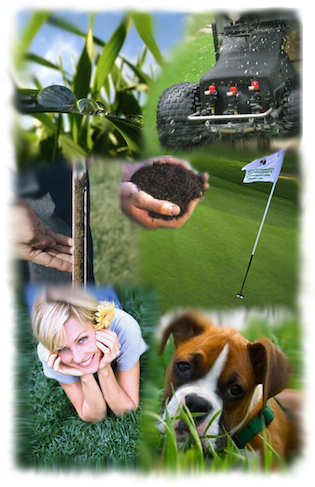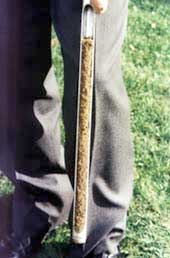Nationally, organic
lawn care is a "hot" topic. As if it were
something new! It certainly is not. Organic lawn care was exclusively
practiced before WWII. After the war, the chemical procedures took
over.

  There
are many misconceptions, myths and outright lies which
have made the subject of organic lawn care almost un-definable. There
are many misconceptions, myths and outright lies which
have made the subject of organic lawn care almost un-definable.

-
Chemical
lawn care companies claim to offer an "organic" lawn care program,
yet often just eliminate pesticides.
-
Chemical companies hire universities to test their products, making it seem like universities only support chemical programs. In addition, college textbooks for green industry professionals became manuals for chemical product use, totally ignoring the “old way” of maintaining healthy lawns, trees and gardens.
-
Strong marketing efforts by chemical companies promoting the ease and low cost of “miracle” products, push other options out of consumer consciousness.
-
Professionals think that using waste products, sewage sludge, manure's, feathers, dried blood, and machines to punch holes in the ground, constitute an organic lawn care program.
-
It has only been more recently that the public has become aware of all of the negative side effects of chemical programs.
-
Until recently, the average homeowner was unaware that truly “organic” programs were available.
No wonder the public is confused.
People don't appreciate what a true organic-based, or organic approach
lawn care program is or what it can be. And, sadly there are only
a few professionals who understand natural systems well enough, and
have available the necessary products and procedures to bring organic
lawn care into the twenty-first century by cooperating with natural
systems that are immutable.
Organic lawn care is, first and foremost, a methodology,
a process, a way of thinking...not just the  substitution of "organic-type"
products for standard fertilizer formulations, and the automatic elimination substitution of "organic-type"
products for standard fertilizer formulations, and the automatic elimination
 of pesticide use because of some "magic." of pesticide use because of some "magic."
Organic lawn care is based upon
solid science. First, one must find out what is needed. Then, according to
what is needed, specialized organic materials are chosen, applied
at the proper time and in the correct quantities.
Going organic takes a little more research, however it is practical and cost effective. The end result is a dramatic minimization of chemical usage, and in many cases even elimination. For the practitioner who embraces these practical principles, a healthier, safer environment is the product delivered to their customers.
Organic lawn care can be practiced by the average homeowner
using Nature's Pro® products. Or, if
you want your lawn care professional to practice an organic lawn care
program for you, he/she can be educated and provided with proven programs
by Nature's Pro®.
What is the basis of an organic
approach lawn care program? The soil. WHY?
What grows in the soil can be no healthier than the soil in which it grows!
The
"challenge" then must be obvious. One homeowner has inherited
a deep, rich soil; another a measly coating of soil over hard-pan
clay, or a sandy soil that simply doesn't work.
  Often, what should be done is
to add truckloads of well rotted compost to the surface and then rototill
everything, the grass included, down 6-8 inches. Other materials, amendments recommended by a comprehensive soil analysis, could be incorporated at the same time. Often, what should be done is
to add truckloads of well rotted compost to the surface and then rototill
everything, the grass included, down 6-8 inches. Other materials, amendments recommended by a comprehensive soil analysis, could be incorporated at the same time.
That's what organic farmers have to do. They plow organic material into their fields every year.
Do you want to rototill up your entire yard? Probably not. It’s unsightly, time consuming, and pretty expensive. Plus, what do you do to keep it healthy after you rebuild your lawn? So the challenge remains.
The solution lies in understanding how to "nurture" the
plant AND the soil at the same time.
The secret is oxygen. Oxygen is needed in the root zone
of all green plants. Roots cannot grow without oxygen. In addition,
oxygen is needed in the soil by a host of hard workers- earthworms,
microbes, insects, algae, protozoa, etc., etc. When, and only when,
oxygen can freely enter and sustain the LIFE within the soil, can
your lawn have the foundation to undertake an organic approach lawn
care program. And, no, you CANNOT cause this to happen by poking holes
into the soil with a machine or spikes on your shoes. Why, because in 30-60 days the impact is over. Besides, it aerates such a small percentage of the soil, usually less than 5%. Mechanical aeration is not the answer.
   After
oxygen has been helped to enter the soil, then you have
to provide fuel energy for the many life forms within the soil so
they can flourish to make the soil truly healthy. After
oxygen has been helped to enter the soil, then you have
to provide fuel energy for the many life forms within the soil so
they can flourish to make the soil truly healthy.
The fuel energy that your soil needs is provided by a product
that nature has made for our use. Humates - carbon-rich, mineral-rich,
enzyme-rich, with latent microbial life...provides the energy to "feed" the
small microbes which then "feed" the larger life within the soil.
These hardworking life forms orchestrate a
soil-health-sustainable-system which is the foundation for your turf's
health!
Now, you can begin to practice
an organic approach! Now, the soil is being "fixed" to promote the growth of turf grass more than weeds. Now, the grass plant is healthy and tough and can
withstand diseases. Now, insect pest damage is probably within tolerable
limits. Implementing organic programs will continue to improve the quality of any soil, making it more productive and life-sustaining. In the process of improving the soil, all plants, from turf grass to giant redwoods, will be growing in a more supportive, productive, and less stressful (disease-laden) environment.
Just as nature had intended... in order to have healthy
plants of all kinds.
-By Robert R. Riley
Pioneer since 1957
in the Organic Approach for Sustainable Turf & Ornamental Care |